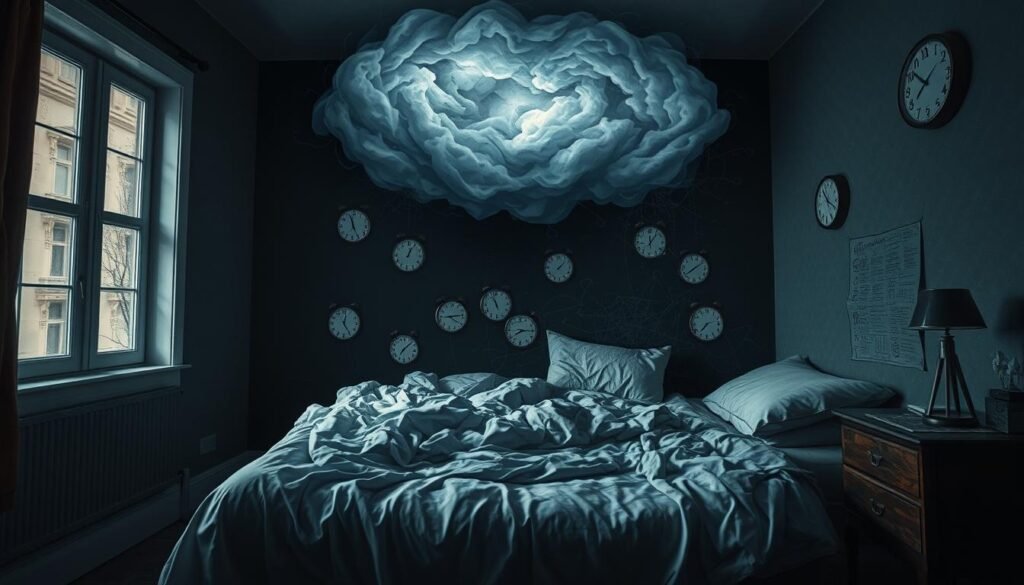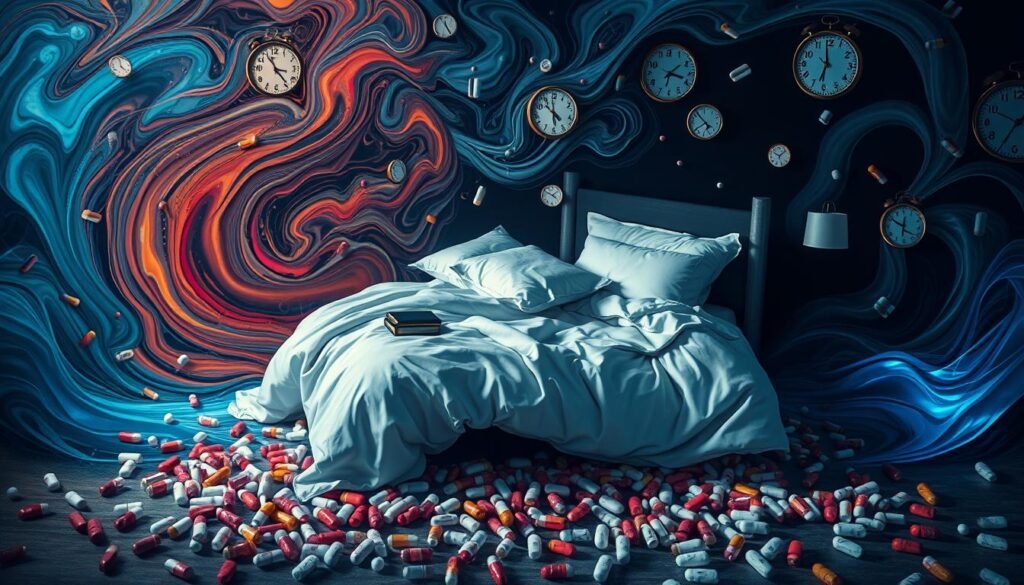Did you know almost 3 out of 4 American adults have sleep issues at some time? Many of them deal with secondary insomnia. This condition is a sign of other health problems. Learning about what causes secondary insomnia helps people improve their sleep and their life quality.
Secondary insomnia is different from not being able to sleep without a clear reason. It’s caused by things like stress, certain medicines, or ongoing pain. As many things can make this sleep problem worse, it’s key to know what they are. When people figure out these causes, they can work on sleeping better and feeling rested.
Key Takeaways
- Secondary insomnia is often linked to underlying medical and mental health issues.
- Improving sleep health involves identifying and addressing triggers that cause sleep disturbances.
- Sleep disorders can affect a person’s daily functioning and overall well-being.
- Awareness of risk factors, such as chronic illness and stress, can aid in prevention.
- Effective treatment may include therapy, lifestyle changes, and, in some cases, medication.
- Establishing good sleep hygiene is essential for managing insomnia symptoms.
- Seeking mental healthcare can positively influence sleep quality and patterns.
What is Secondary Insomnia?
It’s important to know what secondary insomnia definition means. This condition is sleep trouble caused by other medical or mental health issues. Unlike primary insomnia, secondary insomnia comes from things like chronic pain or sleep disorders.
About 10 to 15 percent of people have insomnia, with secondary insomnia being quite common. It’s linked to health problems like Restless Legs Syndrome and Sleep Apnea. Understanding the difference helps in finding the right treatment.
Secondary insomnia shows up in various ways, depending on the insomnia types. Some kids need specific help for their insomnia. Adults, especially those over 60, and women, tend to struggle more with sleep issues.
Treatment like Cognitive Behavioral Therapy for Insomnia (CBT-I) works well. It deals with the main causes of secondary insomnia. Changing lifestyle and learning relaxation tricks can help too. By tackling secondary insomnia from different angles, better sleep and health are possible.
Types of Insomnia
Insomnia is split into two main kinds, acute and chronic. Acute insomnia is short-term, lasting from one night to a few weeks. It’s usually caused by stress, like work demands or upsetting events. On the other hand, chronic insomnia happens more often. It means having trouble sleeping at least three nights weekly for over three months. Knowing the difference is key for finding the right way to handle them.
There are also specific types of insomnia within these broad categories. Sleep-onset insomnia makes it tough to fall asleep at bedtime. If you wake up in the middle of the night and can’t fall back asleep, you might have sleep-maintenance insomnia. Terminal insomnia is when you wake up too early and are unable to go back to sleep. Mixed insomnia means you’re dealing with several of these issues together, making it extra tricky.
It’s important to understand the various forms of insomnia, not just for yourself but also to seek the right treatment. Managing insomnia well can boost your overall health, sleep quality, and how you function each day. To dive deeper into sleep disorders, check out this resource.
Common Causes of Secondary Insomnia
Knowing what causes secondary insomnia helps us understand why people have trouble sleeping. It’s often because of other health problems. Finding out the main reasons behind it can lead to better sleep.
Underlying Medical Conditions
Many health issues can cause secondary insomnia. Problems like hyperthyroidism and sleep apnea change how we sleep. Diseases such as diabetes and heart disease also affect our sleep. They can make us feel uncomfortable or change our hormones, making it hard to sleep well. Knowing about these can help us get the right treatment sooner.
Mental Health Issues
Mental health strongly affects how well we sleep. Anxiety and depression are big reasons why some people can’t sleep well. People with these issues often find it harder to sleep. The stress from these problems makes sleeping well even more difficult. It’s important to see how mental health and sleep are connected to find good ways to deal with sleep problems.
Effects of Stress and Anxiety
Stress and anxiety commonly lead to secondary insomnia. High cortisol levels can create insomnia. This can make falling and staying asleep hard. Being very alert affects sleep quality and length. Worrying about not sleeping only makes the issue worse.
A lot of adults in the USA, about 9% to 20%, have insomnia. In the UK and France, even more people report having trouble sleeping. This shows stress is a big problem. Stress and anxiety badly impact sleep. How people react to stress changes how they sleep.
To sleep better, managing stress is key. It’s important to know what’s causing your stress and how it affects your sleep. Learning how to cope with stress helps avoid insomnia. For more info, check out the studies on how stress affects sleep disorders.

| Study | Findings |
|---|---|
| Bonnet & Arand, 2003 | Stress-related events impair normal sleep function. |
| Drake et al., 2004 | Individuals exhibit varied sleep responses to stress. |
| Morin et al., 2003 | Identifying vulnerabilities to insomnia is critical. |
| Pillai et al., 2013 | Coping behavior influences the sleep response to stress. |
Impact of Chronic Pain
Chronic pain affects one’s well-being greatly, especially sleep quality. Many suffering from chronic pain find it hard to sleep comfortably. Conditions like arthritis and fibromyalgia increase discomfort, causing insomnia effects. This results in more sleep problems. Over 65% of people with chronic pain report sleep issues. This is a big concern for both healthcare providers and patients.
Connection Between Pain and Sleep Disruption
The link between chronic pain and sleep is complicated. About 40% of those with insomnia also have chronic pain. And a huge 50%–88% of pain sufferers have trouble sleeping. Sleep disorders affect 44% of these people, with 72% having insomnia. Poor sleep often makes the pain worse the next day.
Chronic pain patients usually have more light sleep stages. This affects their deep sleep. It can weaken the body’s ability to reduce pain, leading to more pain issues. Poor sleep can make the pain feel stronger and last longer. For many, improving sleep is key to managing their pain better.
Find more info on chronic pain and insomnia by checking out studies here.
Medication Side Effects
Knowing about medication side effects is key to handling sleep issues. Certain drugs can lead to insomnia. These include meds for allergies, high blood pressure, depression, and asthma. For example, stimulants might make it hard to sleep, and antidepressants could mess with your REM sleep.
Talking with your doctor about your meds is important. If a drug disrupts your sleep, there might be other options. The table below shows how some common meds can affect your sleep.
| Medication Class | Common Medications | Potential Insomnia Triggers |
|---|---|---|
| Allergy Medications | Diphenhydramine (Benadryl) | Daytime drowsiness leading to disrupted sleep patterns |
| Antidepressants | Fluoxetine (Prozac), Sertraline (Zoloft) | Possible REM sleep disruption and difficulty initiating sleep |
| Stimulants | Adderall, Methylphenidate (Ritalin) | Difficulty falling asleep and staying asleep |
| High Blood Pressure Medications | Metoprolol, Propranolol | Fatigue and sleep disturbances |
| Asthma Medications | Albuterol | Increased heart rate leading to insomnia |

Substance Abuse and Insomnia
Substance abuse, especially with alcohol and caffeine, can really change sleep patterns. This often results in insomnia. People who can’t sleep well might use these substances hoping to get better sleep. However, this can start a cycle of dependency that makes sleep problems worse.
Alcohol and Caffeine Impact on Sleep
The alcohol impact on sleep is clear. It might make you feel sleepy at first, but it ruins the sleep cycle overall. People often wake up during the night, which stops them from getting restful sleep. For those with alcohol use problems, up to 60% might experience insomnia symptoms because of regular drinking.
Caffeine can disrupt sleep just as much. As a stimulant, it makes it hard to fall and stay asleep. If you consume a lot of caffeine every day, you’re more likely to have sleep issues. Mixing alcohol and caffeine can make sleep problems even worse, bringing on more severe insomnia symptoms.
Getting to know how substance use and insomnia are connected can help people find better treatments. If you’re dealing with both insomnia and substance abuse, focusing on good sleep habits and asking for professional help are key steps to breaking the cycle.
Hormonal Imbalances and Sleep Disorders
Hormonal imbalances are a big reason why people have sleep problems like insomnia. Pregnancy and menopause often cause these imbalances, upsetting many individuals’ sleep. Menopause, in particular, is known for making insomnia common.
During pregnancy and after giving birth, many women find their sleep gets worse. Thyroid issues can also mess with sleep by throwing off hormone levels. As people age, they produce less melatonin, which doesn’t help with sleep either.
Being stressed a lot can shake up your hormone balance, leading to trouble sleeping. The way hormones like estrogen and progesterone affect sleep isn’t fully known. But when they drop, especially during menopause or menstrual cycles, it can make sleeping hard.
Hormones such as growth hormone, leptin, and ghrelin also play a part in how we sleep. Speaking of treatments, lifestyle changes and natural fixes like melatonin supplements can help. There’s also therapy, like CBT, and hormone replacement therapy for those really struggling.

| Life Stage | Insomnia Symptoms | Relevant Hormones |
|---|---|---|
| Pregnancy | Increased sleep disruptions | Estrogen, Progesterone |
| Menopause | Common insomnia symptom | Estrogen, Progesterone |
| Postpartum | Prolonged sleep issues | Estrogen |
| Older Age | Higher insomnia rates | Melatonin |
| Thyroid Disorders | Disrupted sleep | Thyroid Hormones |
Creating a Better Sleep Environment
Creating the right sleep setting is key to tackling issues like secondary insomnia. A lot of things affect how well you sleep, and making these better can help a lot. Making sure your bedroom is dark, quiet, and cool is very important for good sleep.
Factors Influencing Sleep Quality
Some big things impact how well your sleep setting works:
- Room Temperature: Keeping it cool helps a lot because a comfy room means better sleep.
- Noise Control: Less noise means fewer sleep disruptions.
- Light Exposure: A dark room tells your body it’s sleep time, helping your body’s natural sleep-wake cycle.
- Bedding Quality: Good mattresses and bedding support relaxed sleep.
- Bedtime Routines: Calming activities before bed like reading or meditating can help your brain get ready for sleep.
These steps are among the top ways to tackle insomnia. Studies show keeping a regular sleep schedule is very important. Light exercise matters too, as it lowers the chance of insomnia and boosts well-being.
Learning about good sleep habits is important for sleep hygiene. Knowing what your body needs to rest well makes a big difference in sleep quality. By improving your sleep environment, you can fight insomnia and better your life quality.
Prevention and Management of Secondary Insomnia
Getting a good night’s sleep means making some changes. This starts with practicing good sleep hygiene. Keeping a steady sleep schedule trains your body to sleep better.
Try to avoid things like caffeine and alcohol late in the day. They can make it hard to sleep. Adding regular workouts can also help you get deeper sleep.
CBT is a big help for long-term insomnia. It works as well, or even better, than sleeping pills. It deals with the thoughts that keep you awake. Techniques like relaxation and sleep control can really make a difference.
It’s smart to talk to doctors about sleep medicines. Drugs can help, but it’s best not to use them for too long. There are risks, like side effects and getting dependent.
Looking for natural sleep aids? Melatonin or yoga might help. But, check with your doctor first to make sure they’re right for you.
As the American Psychiatric Association (APA) states, insomnia is common. It hits about one-third of all adults. Acting early to keep sleep patterns healthy is key to feeling better overall.
Conclusion
Learning about the complex nature of secondary insomnia is key for anyone struggling with sleep. This sleep disorder touches many lives, especially women’s. It comes from different medical issues, surroundings, or lifestyle choices.
People need to know these factors to tackle sleep problems better. This will help improve their sleep quality overall.
Also, it’s vital to get help from healthcare experts. Treatments like cognitive-behavioral therapy and changing daily habits can help. This way, people can find their way to sleeping well again. Insomnia usually comes from many reasons, so customized treatments work best.
The path to good sleep health is about knowing and doing. Understanding insomnia leads to smarter health choices. This opens the door to better sleep and a healthier life.
With the right steps, everyone can turn their nights around. This shift from being awake to sleeping well can greatly boost life quality.